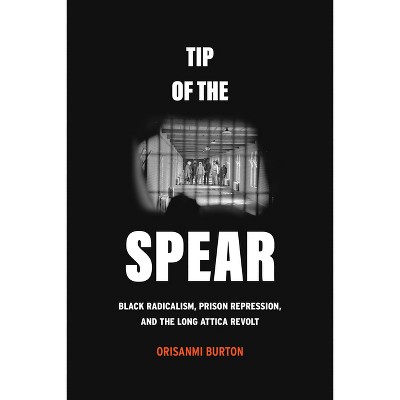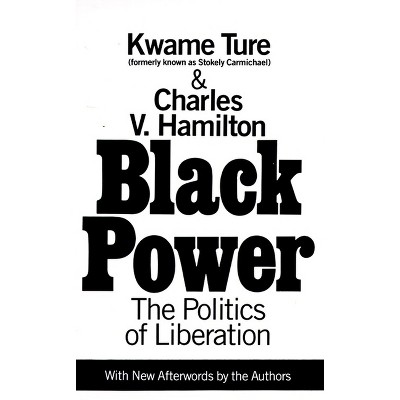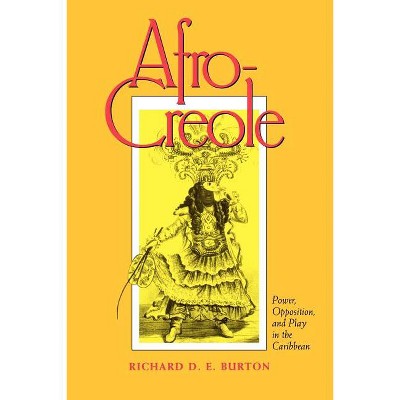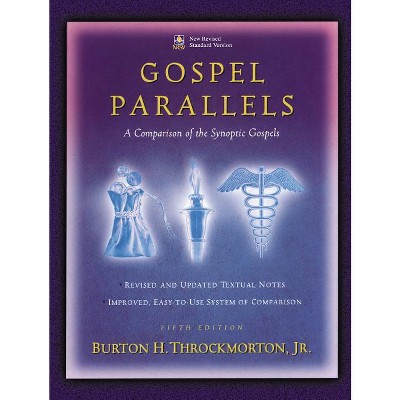Sponsored

Tip of the Spear - by Orisanmi Burton
$95.99
In Stock
Eligible for registries and wish lists
Sponsored
About this item
Highlights
- A radical reinterpretation of "Attica," the revolutionary 1970s uprising that galvanized abolitionist movements and transformed prisons.
- About the Author: Orisanmi Burton is Assistant Professor of Anthropology at American University.
- 328 Pages
- Social Science, Ethnic Studies
Description
About the Book
"Tip of the Spear boldly and compellingly argues that prisons are a domain of hidden warfare within US borders. Orisanmi Burton explores what he terms the Long Attica Revolt, a criminalized tradition of Black radicalism that propelled rebellions in New York prisons during the 1970s. The reaction to this revolt illuminates what Burton calls prison pacification: the coordinated tactics of violence, isolation, sexual terror, propaganda, reform, and white supremacist science and technology that state actors use to eliminate Black resistance within and beyond prison walls. Burton goes beyond the state records that other histories have relied on for the story of Attica and expands that archive, drawing on oral history and applying Black radical theory in ways that center the intellectual and political goals of the incarcerated people who led the struggle. Packed with little-known insights from the prison movement, the Black Panther Party, and the Black Liberation Army, Tip of the Spear promises to transform our understanding of prisons-not only as sites of race war and class war, of counterinsurgency and genocide, but also as sources of defiant Black life, revolutionary consciousness, and abolitionist possibility"--Book Synopsis
A radical reinterpretation of "Attica," the revolutionary 1970s uprising that galvanized abolitionist movements and transformed prisons. Tip of the Spear boldly and compellingly argues that prisons are a domain of hidden warfare within US borders. With this book, Orisanmi Burton explores what he terms the Long Attica Revolt, a criminalized tradition of Black radicalism that propelled rebellions in New York prisons during the 1970s. The reaction to this revolt illuminates what Burton calls prison pacification: the coordinated tactics of violence, isolation, sexual terror, propaganda, reform, and white supremacist science and technology that state actors use to eliminate Black resistance within and beyond prison walls. Burton goes beyond the state records that other histories have relied on for the story of Attica and expands that archive, drawing on oral history and applying Black radical theory in ways that center the intellectual and political goals of the incarcerated people who led the struggle. Packed with little-known insights from the prison movement, the Black Panther Party, and the Black Liberation Army, Tip of the Spear promises to transform our understanding of prisons--not only as sites of race war and class war, of counterinsurgency and genocide, but also as sources of defiant Black life, revolutionary consciousness, and abolitionist possibility.From the Back Cover
"Orisanmi Burton takes narrative and analysis to another level. His scholarship comprehends resistance with a nuance that I have not seen delivered by most academics."--Joy James, author of In Pursuit of Revolutionary Love and New Bones Abolition "Tip of the Spear transforms our understanding of prison rebellion. In so doing, the book offers a stunning contribution to Black radical thought and abolitionist scholarship and politics. Exquisitely researched and argued, this is a must-read."--Sarah Haley, author of No Mercy Here: Gender, Punishment, and the Making of Jim Crow Modernity "In this meticulously researched and beautifully written book, Burton presents one of the most dynamic accounts of Black revolutionary struggle against the prison industrial complex to date. Burton centers Black radical action as the hub of knowledge production to explain the function, implementation, and logic of the carceral apparatus over the past fifty years. Powerfully arguing against the ill-conceived notion of Black revolt as spontaneous and state violence as the happenstance of misguided policy, Burton carefully takes the reader through a rigorously developed source map to understand the breadth and depth of prisons within the twentieth and twenty-first centuries. With a brilliant array of methodological, conceptual, and theoretical interventions, Tip of the Spear is a must-read and is fundamental to the study of prisons and movements against prisons."--Damien Sojoyner, author of Joy and Pain: A Story of Black Life and Liberation in Five AlbumsReview Quotes
"Tip of the Spear is an exemplar of methodological innovation. Burton approaches the archives with the aim to center the criminalized and marginalized knowledge of Black radicals as indispensable in comprehending the Long Attica Revolt--a source of
knowledge that is often unexamined in extant accounts of the Attica Revolt."
-- "Sociology of Race and Ethnicity"
"Tip of the Spear. . . . Highlights the global connections of carceral rebellion, refusing to reduce them to demands for institutional reform, and instead shows how these actions ripple out, influencing radical Black history."
-- "American Quarterly"
"Burton immerses his reader into the universe of prisoners in revolt not only to document the horrors of incarceration, but more significantly to highlight their most basic, common demand: freedom."-- "Michigan Law Review"
"Tip of the Spear critically pushes back against the tendency of liberal histories to either gloss over the Black radical prisoners' engagement in armed struggle or to frame such actions as the work of a fringe. . . . Burton's account powerfully disrupts the normative, state-friendly script that narrates the prisoners' violence as unjustified, condemnable, and thus worthy of decentering, instead framing their revolt as a quite reasonable (and arguably still restrained) reaction."-- "The Nation"
"Tip of the Spear makes visible the inextricable links between anti-Blackness, nation state-sanctioned surveillance of marginalized populations, and the violent ends to which the nation-state will go to suppress race-based liberation that threatens to undermine white supremacy and the 'legitimacy' of a carceral system that functions because of oppressive policy making. . . . This text is an invaluable addition to abolition theory and scholarship."-- "Ethnic Studies Review"
"This book covers a good deal of historical, sociological, and anthropological ground in its critique of mass incarceration and related strategies of social control. The detailed interconnections that it draws between US carcerality, Black radical thought, and abolitionist approaches to social inequality demand stringent reassessment of academia's and public policy's conventional ways of interpreting unequal relations of power. . . . Tip of the Spear should be read by everyone, including scholars, students, activists, and the broader reading public."-- "Anthropological Quarterly"
"A model of committed historical and ethnographic scholarship, Burton has produced an analysis of revolution and counter-insurgency in the crucible of racialized class war that is the prison while also leaving us with a methodology for rigorous, principled work that foregrounds the knowledge and experiences of the people whose potential to be the protagonists of history is precisely the reason for their captivity. In this way, Burton has essentially succeeded in writing a book that is both excavation of the past and blueprint for how to read present and future struggles."-- "Crime Media Culture"
"Burton's book gives readers a new conceptual language, a new framework, and a new orientation for any future research on Black radical consciousness, carcerality, and abolition. It will change the fields of critical carceral studies and counterinsurgency and will give new direction to the anthropology of Black masculinity and prisons as sites of warfare."-- "Current Anthropology"
"Meticulously researched and fascinating. . . . By placing the prison struggle as part of a domestic war, this book makes an enormous contribution to efforts to fight against prison expansion and for true abolition."-- "Against the Current"
"This book is essential material for undergraduate and graduate courses not only in anthropology, but in a range of disciplines drawing from Black radical theory, abolition and critical prison studies, archives of war and counter-insurgency, masculinity and gender studies, geography, sociology, and the history of social movements in the United States. This is a deep work, rigorously engaging with archives that have historically been dismissed, overlooked, or repressed. It is also beautifully written, inviting us into the worldmaking of Attica."-- "Medical Anthropology Quarterly"
"Tip of the Spear imagines an abolitionist ethic of horizontal possibility and proposes the radical demand that we make meaning together."-- "Public Books"
"Not only is Tip of the Spear an important addition to the growing volume of literature regarding the role of prisons in the racist capitalist state that is the US, the thesis of the text represents a major evolution in the historical representation of US prisons."-- "The Morning Star"
"With Tip of the Spear, Burton hasn't just salvaged the imprisoned Black radical tradition from the condescension of liberal posterity, but provided a singular lesson in militant intellectual method, shedding stark illumination on the counterinsurgent genealogy of prison reform (between philanthropy and psyops) while doing justice to an abolitionist horizon oriented toward maximum demands rather than piecemeal adaptations."-- "Verso Author Pick"
"Burton gives readers a deeply-felt look at the activists who participated in these revolts. . . . His interviews with survivors are incisive and reflect an appreciation of the political knowledge and passion that led these men to foment rebellion, however risky."-- "The Progressive"
"A fresh and urgent interpretation of the meaning of Attica. . . . Burton has crafted a masterpiece that, as much as any single book can, shows the way forward for a new generation of activist-scholars, agitators, revolutionaries, and other partisans of human liberation, to redeem the dead and build a new society in their name."-- "Los Angeles Review of Books"
"A remarkable account of how prison repression and reform intertwine, one that poses fundamental dilemmas about whether our legal system can ever properly serve movements for social change. It is a book that will unsettle and enrage you. It should also become the account of Attica that every interested person reads."-- "Inquest"
"Not only is Tip of the Spear an important addition to the growing volume of literature regarding the role of prisons in the racist capitalist state that is the United States, the thesis of the text represents a major evolution in the historical representation of US prisons."-- "CounterPunch"
"Magnificent. . . . Tip of the Spear is a massive accomplishment of scholarship and political analysis."-- "Propaganda in Focus"
About the Author
Orisanmi Burton is Assistant Professor of Anthropology at American University.Dimensions (Overall): 9.1 Inches (H) x 5.9 Inches (W) x 1.0 Inches (D)
Weight: 1.28 Pounds
Suggested Age: 22 Years and Up
Sub-Genre: Ethnic Studies
Genre: Social Science
Number of Pages: 328
Publisher: University of California Press
Theme: African American Studies
Format: Hardcover
Author: Orisanmi Burton
Language: English
Street Date: October 31, 2023
TCIN: 88942114
UPC: 9780520396319
Item Number (DPCI): 247-56-0639
Origin: Made in the USA or Imported
If the item details aren’t accurate or complete, we want to know about it.
Shipping details
Estimated ship dimensions: 1 inches length x 5.9 inches width x 9.1 inches height
Estimated ship weight: 1.28 pounds
We regret that this item cannot be shipped to PO Boxes.
This item cannot be shipped to the following locations: American Samoa (see also separate entry under AS), Guam (see also separate entry under GU), Northern Mariana Islands, Puerto Rico (see also separate entry under PR), United States Minor Outlying Islands, Virgin Islands, U.S., APO/FPO
Return details
This item can be returned to any Target store or Target.com.
This item must be returned within 90 days of the date it was purchased in store, shipped, delivered by a Shipt shopper, or made ready for pickup.
See the return policy for complete information.











